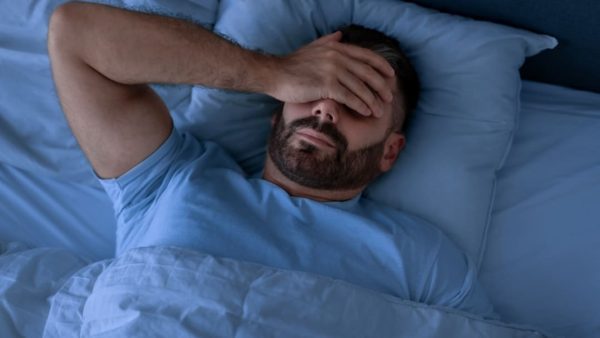Looking for Expert-Level VA Claim Answers?📱Call Us Now! 737-295-2226
Insomnia, characterized by difficulty falling or staying asleep, is a significant issue among veterans and can severely impact their work, life, relationships, and social functioning.
Many veterans develop chronic sleep problems due to their military service.
Historically, the VA recognized insomnia as a standalone disability, but recent policy adjustments have redefined its classification.
The VA now considers insomnia primarily as a symptom of another mental or physical health condition rather than an independent, ratable disorder on its own.
Veterans seeking VA disability compensation for insomnia need to understand how the VA currently evaluates sleep disorders and what options exist for service connection.
Table of Contents
Summary of Key Points
- Insomnia is typically not a standalone ratable condition because the VA considers it a symptom of another disability rather than an independent disorder.
- The VA rates insomnia under the primary condition (e.g., PTSD, chronic pain, neurological disorder, sleep apnea).
- A separate insomnia disorder rating is only possible if all other causes are first ruled out, requiring a DSM-5 diagnosis, an in-service event, and a medical nexus.
- Veterans should submit strong medical evidence (medical records, DBQs, and Nexus Letters) to support their claims.
Why the VA Generally Will NOT Rate Insomnia as a Standalone Condition
The VA’s Schedule for Rating Disabilities (38 CFR § 4.130) provides diagnostic codes for mental health disorders, but no longer lists insomnia as a separately ratable condition.
Instead, the VA classifies insomnia as a symptom of another service-connected disability, such as:
- Mental health conditions (e.g., PTSD, major depressive disorder, generalized anxiety disorder).
- Chronic pain conditions (e.g., back injuries, migraines, fibromyalgia).
- Neurological disorders (e.g., traumatic brain injury [TBI]).
- Breathing-related sleep disorders (e.g., sleep apnea).
Example: A veteran suffering from PTSD experiences severe nightmares, hypervigilance, and difficulty sleeping. In this case, the insomnia would be rated as part of PTSD, rather than as a separate disability. By incorporating insomnia symptoms into the rating of the primary condition, the VA avoids duplicate ratings while ensuring the full impact of the disability is considered.
How the VA Rates Insomnia as a Symptom of Another Disability
Since insomnia is linked to a primary condition, the VA evaluates its impact under the diagnostic code of the primary disability:
- If insomnia is due to PTSD, depression, or anxiety, it is rated under 38 CFR § 4.130 (General Rating Formula for Mental Disorders).
- If insomnia is linked to chronic pain or a service-connected physical condition, it may be rated as a secondary condition if a medical nexus establishes the connection. However, even in this case, the VA will sometimes rate a different mental health condition secondary to pain or other service-connected physical condition and include insomnia as a symptom.
- If insomnia is caused by a breathing-related sleep disorder (e.g., sleep apnea), the VA evaluates it under 38 CFR § 4.97, Diagnostic Code 6847 (Sleep Apnea Syndromes).
Example: A veteran with service-connected migraines suffers from chronic sleep deprivation due to persistent headaches. A medical opinion from their doctor states that the migraines are causing the insomnia. In this case, the veteran can file for secondary service connection, linking insomnia to the already service-connected migraines.
When Can Insomnia Be Service-Connected on Its Own?
Although insomnia is normally not ratable on its own, the VA may grant direct service connection if all other potential causes are ruled out.
In accordance with M21-1, to qualify for insomnia disorder as a primary service-connected disability, a veteran must show:
- An in-service event or diagnosis: Proof that insomnia was diagnosed or reported during military service.
- A current diagnosis: A DSM-5 diagnosis of “insomnia disorder” from a licensed medical provider.
- A medical nexus: Evidence linking the veteran’s insomnia disorder to their military service.
- No other underlying conditions: The insomnia must not be linked to a mental health or physical condition.
Example: A veteran was diagnosed with primary insomnia while on active duty due to night shift work and high-stress missions. They continued to experience severe, unmanageable sleep problems post-service with no other medical or mental health diagnosis. In this case, the veteran may qualify for direct service connection if a VA examiner confirms the connection. However, the burden of proof is high because the VA expects a DSM-5 diagnosis that rules out all other potential causes.
How the VA Rates Mental Health Conditions to Include Insomnia
The VA uses the General Rating Formula for Mental Disorders from 38 CFR § 4.130 to rate mental health conditions, to include insomnia, from 0% to 100% with breaks at 10%, 30%, 50%, and 70%.
| Level of Occupational and Social Impairment and Approximate Severity of Symptoms for Mental Health and Insomnia | VA Rating | Minimum Monthly Payment |
|---|---|---|
| Total occupational and social impairment, due to such symptoms as: gross impairment in thought processes or communication; persistent delusions or hallucinations; grossly inappropriate behavior; persistent danger of hurting self or others; intermittent inability to perform activities of daily living (including maintenance of minimal personal hygiene); disorientation to time or place; memory loss for names of close relatives, own occupation, or own name. | 100% | $3,831.30 |
| Occupational and social impairment, with deficiencies in most areas, such as work, school, family relations, judgment, thinking, or mood, due to such symptoms as: suicidal ideation; obsessional rituals which interfere with routine activities; speech intermittently illogical, obscure, or irrelevant; near-continuous panic or depression affecting the ability to function independently, appropriately and effectively; impaired impulse control (such as unprovoked irritability with periods of violence); spatial disorientation; neglect of personal appearance and hygiene; difficulty in adapting to stressful circumstances (including work or a worklike setting); inability to establish and maintain effective relationships. | 70% | $1,759.19 |
| Occupational and social impairment with reduced reliability and productivity due to such symptoms as: flattened affect; circumstantial, circumlocutory, or stereotyped speech; panic attacks more than once a week; difficulty in understanding complex commands; impairment of short- and long-term memory (e.g., retention of only highly learned material, forgetting to complete tasks); impaired judgment; impaired abstract thinking; disturbances of motivation and mood; difficulty in establishing and maintaining effective work and social relationships. | 50% | $1,102.04 |
| Occupational and social impairment with occasional decrease in work efficiency and intermittent periods of inability to perform occupational tasks (although generally functioning satisfactorily, with routine behavior, self-care, and conversation normal), due to such symptoms as: depressed mood, anxiety, suspiciousness, panic attacks (weekly or less often), chronic sleep impairment, mild memory loss (such as forgetting names, directions, recent events). | 30% | $537.42 |
| Occupational and social impairment due to mild or transient symptoms which decrease work efficiency and ability to perform occupational tasks only during periods of significant stress, or symptoms controlled by continuous medication. | 10% | $175.51 |
| A mental condition has been formally diagnosed, but symptoms are not severe enough either to interfere with occupational and social functioning or to require continuous medication. | 0% | Non-Compensable |
Filing a VA Disability Claim for Insomnia
If a veteran experiences insomnia, they should file a VA disability claim under the appropriate primary condition, which in our experience is typically tied to another mental health condition such as PTSD, depression, or anxiety, among others.
Step #1: Gather Detailed Medical Evidence
- Obtain a formal diagnosis from a licensed medical provider.
- Document how insomnia affects daily life, work, and social functioning.
- Secure a Nexus Letter if claiming insomnia or other mental disorder as a secondary condition.
Step #2: File for Service Connection Based on the Most Likely Cause
- If insomnia is part of PTSD, depression, anxiety, or other mental file under mental health conditions.
- If insomnia is due to a physical disability, file for secondary service connection.
- If insomnia disorder was diagnosed during service and has no other cause, attempt direct service connection.
Step #3: Prepare for the Compensation & Pension (C&P) Exam
- Explain how insomnia impacts your work, life, and social functioning.
- Emphasize your frequency, severity, and duration of symptoms using the VA’s 31 mental health symptoms checklist.
- Be honest and detailed about the effects of sleep deprivation.
Example: A veteran develops severe sleep problems due to chronic back pain caused by a service-connected spinal injury. They submit a DBQ and Nexus Letter from a private doctor, confirming that the pain-induced insomnia is directly linked to their spinal condition. The VA grants secondary service connection for insomnia and increases the veteran’s overall disability rating.
Can I Have a Separate VA Disability Rating for Anxiety and Insomnia?
No, the VA does not typically grant a separate disability rating for insomnia if it is linked to another mental health condition like anxiety, PTSD, or depression.
The VA prohibits pyramiding under 38 CFR § 4.14, which means a veteran cannot receive separate disability ratings for multiple conditions that produce overlapping symptoms.
Instead, insomnia is considered a symptom of the primary mental health condition and is factored into the overall disability rating under 38 CFR § 4.130 (General Rating Formula for Mental Disorders).
However, if insomnia is not caused by a mental health condition and can be directly service-connected with no other underlying cause, it may qualify for a separate VA disability rating under an appropriate analogous diagnostic code.
This is rare and requires strong medical evidence, including a DSM-5 diagnosis, proof of an in-service event, and a clear nexus linking insomnia to military service.
Conclusion & Wrap-Up
Understanding how the VA evaluates insomnia for disability compensation is critical for veterans seeking benefits.
While insomnia can severely impact daily life, work, and relationships, the VA does not recognize it as a standalone ratable condition in most cases.
Instead, insomnia is rated as a symptom of an underlying mental or physical health condition and is factored into the overall disability rating for that primary condition.
For veterans filing VA disability claims for insomnia, the best approach is to:
- Identify the root cause: whether mental health-related (e.g., PTSD, depression, anxiety) or physical (e.g., chronic pain, TBI, sleep apnea).
- Gather strong medical evidence: including a formal DSM-5 diagnosis, medical records, DBQs, and a Nexus Letter if insomnia is claimed as a secondary condition.
- File under the appropriate category: Typically, as a symptom of a mental health condition or as a secondary condition to a service-connected physical disability.
- Prepare for the C&P exam: providing detailed explanations of how insomnia affects daily life, work, and mental well-being.
While direct service connection for insomnia disorder is possible, it requires clear medical evidence, proof of an in-service event, and no other underlying conditions contributing to the sleep disturbance.
The burden of proof is high, so veterans should be prepared to provide extensive documentation.
Stay informed, be persistent, and leverage expert resources like VA Claims Insider to help you navigate the process.
If you need expert help navigating the VA claims process, our team of VA claim coaches is ready to educate and empower you to victory!
✅ If you’re sick and tired of waiting and want expert guidance to get the VA rating and compensation you deserve faster, CALL US RIGHT NOW at 737-295-2226 for a no-obligation VA claim consultation!
FAQs
Can I get VA disability for insomnia?
Yes, but often not as a standalone condition. The VA usually considers insomnia a symptom of another service-connected disability, such as PTSD, chronic pain, or sleep apnea.
When is insomnia rated on its own?
Only in rare cases, if you have a DSM-5 diagnosis of insomnia disorder, an in-service event, and no other underlying cause, the VA may grant direct service connection. This requires strong medical evidence and a nexus letter.
What rating can I get for insomnia through the VA?
The VA doesn’t assign a specific rating for insomnia. Instead, it’s factored into the rating for your primary condition, usually under the General Rating Formula for Mental Disorders (38 CFR § 4.130).
Can I be rated for both anxiety and insomnia?
No. If insomnia is caused by anxiety, both are considered part of a single mental health rating to avoid “pyramiding” (duplicate ratings for overlapping symptoms).
What do I need to support my claim for insomnia?
A formal diagnosis, detailed medical records, and (if secondary) a nexus letter linking your insomnia to an existing service-connected condition. The VA may also require a C&P exam to assess symptom impact.
Will a mental health VA rating affect my security clearance?
It’s a MYTH that having Insomnia, PTSD, or any other mental health condition will affect your security clearance. Of course, you’ll need to report it to your security manager and update your SF-86; however, it has no impact on your security clearance.
Want Expert-Level VA Claim Support? WE GOT YOUR SIX!
How does VA Claims Insider help veterans?
We make the confusing and frustrating VA claim process EASY through our 8-step proprietary system and one-on-one coaching; we’re the VA Claim EXPERTS you can trust, and YOU are never alone in this fight against the VA!
You’ll also receive VA disability expert Brian Reese’s SEM Method Blueprint—a proven formula that has helped over 25,000 veterans win their VA disability claims faster:
Strategy + Education + Medical Evidence = VA Rating and Compensation You Deserve FASTER!
Start today and unlock an exceptional level of service you deserve for serving our country:
➡️ You’ll hear from a VA Claim Expert over email within 15 minutes of signing up today.
➡️ You’ll hear from your Veteran Coach team within 24 hours of all inquiries during normal business days/hours.
➡️ Our terms are simple: IF WE DON’T WIN, YOU DON’T PAY. You have nothing to lose and everything to gain!
Click the red button below to start the process of winning your VA claim right now:
Fellow Veterans: Are You Ready to WIN, SERVICE-CONNECT, and INCREASE Your VA Disability Rating FASTER?

- VA Claims Insider is the #1 most trusted name in VA disability claims.
- Work directly with a VA claims coach who can help lead you to VA claim victory.
- 25,000+ disabled veterans served in our membership programs since 2016.
- 30% average rating increase for veterans who complete our #1-rated Elite program.
- 4.7/5.0 average rating out of 6,000+ total reviews; over 5,000 5-star reviews.
About the Author

Brian Reese
Brian Reese is a world-renowned VA disability benefits expert and the #1 bestselling author of VA Claim Secrets and You Deserve It. Motivated by his own frustration with the VA claim process, Brian founded VA Claims Insider to help disabled veterans secure their VA disability compensation faster, regardless of their past struggles with the VA. Since 2013, he has positively impacted the lives of over 10 million military, veterans, and their families.
A former active-duty Air Force officer, Brian has extensive experience leading diverse teams in challenging international environments, including a combat tour in Afghanistan in 2011 supporting Operation ENDURING FREEDOM.
Brian is a Distinguished Graduate of Management from the United States Air Force Academy and earned his MBA from Oklahoma State University’s Spears School of Business, where he was a National Honor Scholar, ranking in the top 1% of his class.



